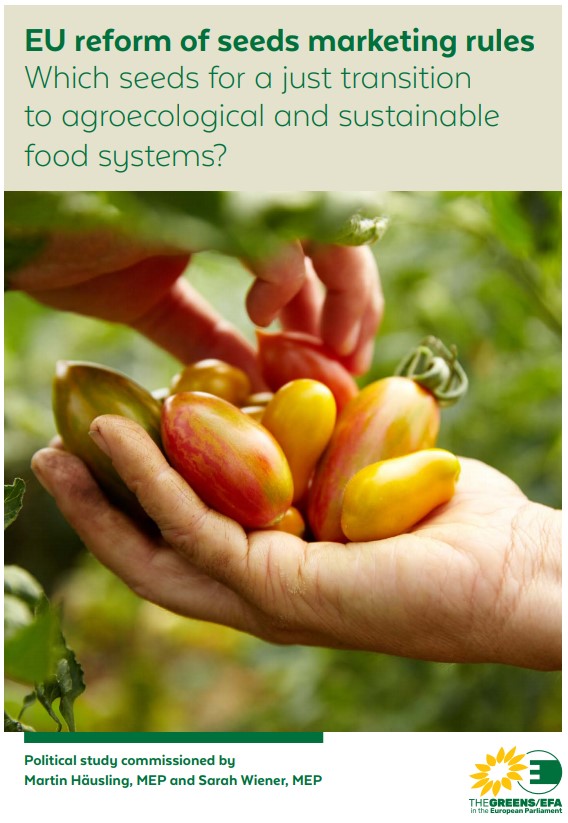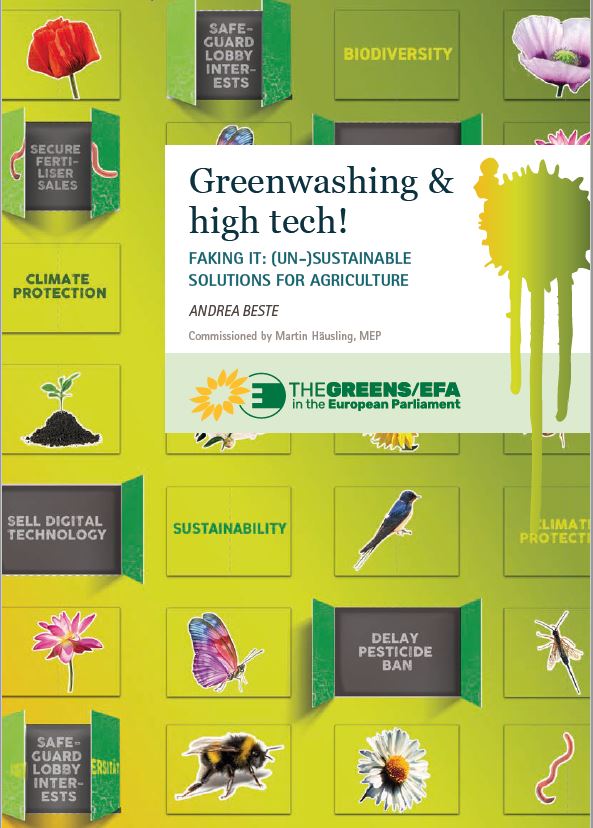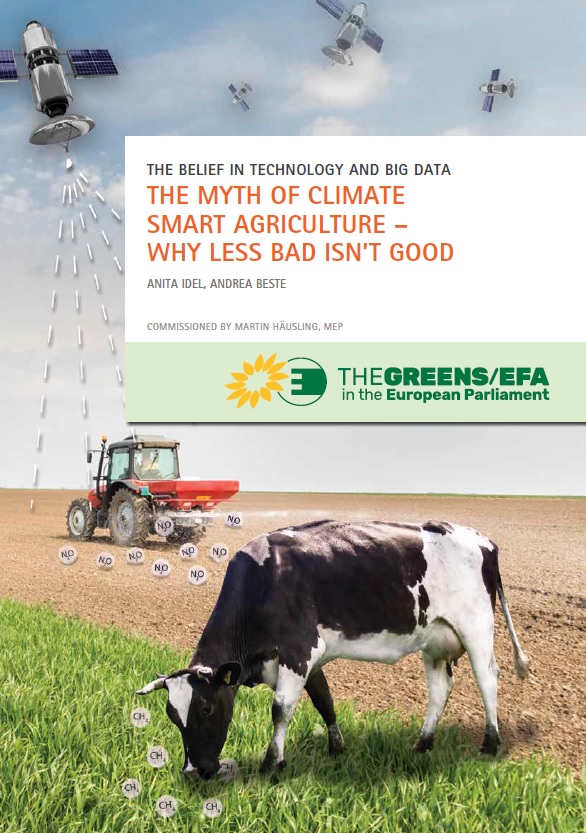- 04. Juli 2023
The possible deregulation of certain GMOS in the EU: what would the implications be? A pathways analysis
The possible deregulation of certain GMOS in the EU: what would the implications be? A pathways analysis
The European Commission wants to deregulate certain genetically modified (GM) plants developed with new genetic engineering techniques, in order to facilitate their commercialisation in the EU.
However, the large-scale commercialisation of GM plants is expected to lead to higher seed prices, less seed breeding innovation and a reduced availability, diversity and choice of seeds.
This is the lesson learnt from countries like the U.S. that have embraced GM crops, and where farmers have planted them at scale. These countries' agricultural sectors got locked into a pathway of input-dependent, industrialised farming practices with devastating impacts on biodiversity, climate and the farming community.
Our study warns that, in the context of existing intellectual property regimes, the deregulation of certain GM crops and foods could have wide and long-term implications for the broader sustainable and equitable development of the EU’s agri-food systems.
These potential implications should be weighed carefully in a broad and democratic debate, which should prioritise the desired sustainable directions for European agriculture and food systems, rather than placing a naïve faith in the supposed power of a singular technological pathway that locks farmers, input suppliers, food companies and consumers into an input-dependent technology treadmill.
- 22. Mai 2023
Study - REDUCE ANTIBIOTICS - AVOIDING RESERVE ANTIBIOTICS IN FARM ANIMALS
Frank Brendel and Andreas Striezel
On behalf of The Greens/EFA in the European Parliament
- 05. Januar 2023
Study on EU reform of seeds marketing rules: Which seeds for a just transition to agroecological and sustainable food systems?

EU reform of seeds marketing rules:
Which seeds for a just transition to agroecological and sustainable food systems?
DECEMBER 2022
Author: Magdalena Prieler:
She works as a policy officer for ARCHE NOAH in Austria and Brussels. As a non-profit association with a broad member base, ARCHE NOAH (“Noah’s Ark”) is dedicated to the conservation, development and dissemination of endangered cultivated plants.
Publisher:
Martin Häusling MEP
Sarah Wiener MEP
The Greens/EFA in the European Parliament
Rue Wiertz 60, 1047 Brussels
More information here: https://www.arc2020.eu/seed-marketing-reform-commission-hints-at-faustian-hybrid/
- 23. März 2022
Factsheet on war in Ukraine & supply situation
The war Putin is waging against Ukraine is a humanitarian and international legal disaster. It is existential that and how the European Union acts here together with its allies. The acts of war are costing more and more lives and forcing women and children to flee. In addition, there are serious consequences for the agricultural sector.
We hereby take a stand on the current discussion about an allegedly necessary rollback towards further intensification of agriculture. We consider this to be a serious mistake, as it would mean fuelling the climate and species crisis. The overexploitation and pollution of our natural resources - air, water, soil - and the loss of biodiversity are already leading directly and indirectly to yield losses, with all the known consequences.
However, we must now help acutely and at the same time think about the food security of tomorrow.
Quote Martin Häusling:
"The current attempts to use the war in Ukraine to question the objectives of the Farm-to-Fork and Biodiversity Strategies with the rhetorical catchword of "food security", I consider to be completely short-sighted and not in line with scientific recommendations. The climate and biodiversity crises are not taking a break, even in the current situation. The statement of 300 scientists, among others from the PIK Potsdam Institute for Climate Impact Research, clearly calls for a transformation of the food system: less meat and food waste, more legumes and a greener agricultural policy.
- 11. Februar 2022
STUDY: GREENWASHING & HIGH TECH - Faking it: (un-)sustainable solutions for agriculture

The climate crisis and species extinction are the biggest challenges for agriculture at present. Every study and international report correctly says: agriculture is both, perpetrator and victim. The vast majority of international and European scientists agree that the manner in which we farm has to change fundamentally. It is uncontested that intensive animal agriculture and intensive nitrogen fertilisation are harming the climate and that monocultures and high pesticide use contribute significantly to species extinction.
The obvious solution would be to promote agricultural systems which, by definition, rear animals less intensively and use far less synthetic nitrogen and fewer pesticides and thereby are proven to allow for more biodiversity as well as lower nitrogen levelsin water courses – systems such as organic agriculture.
But instead something strange happens: new, supposedly innovative techniques keep cropping up and find their way into political policy papers even though they have nowhere near the same synergetic potential for positive effects on the agroecosystem.
- 26. April 2021
SCIENTIFIC CRITIQUE OF LEOPOLDINA AND EASAC STATEMENTS ON GENOME EDITED PLANTS IN THE EU
SCIENTIFIC CRITIQUE OF LEOPOLDINA AND EASAC STATEMENTS ON GENOME EDITED PLANTS IN THE EU
- 08. April 2020
Study: The myth of climate smart agriculture – why less bad isn't good
 For practical agriculture it will be very important, even essential, to develop or rediscover adaptation systems which minimise the risks brought about by climate change. Agricultural systems have to be geared first and foremost towards resilience rather than highest yields. That goes for torrential rains as well as drought and increasing pest pressure. Almost all measures that increase resilience are at the same time climate-friendly, organic agriculture being the best example.
For practical agriculture it will be very important, even essential, to develop or rediscover adaptation systems which minimise the risks brought about by climate change. Agricultural systems have to be geared first and foremost towards resilience rather than highest yields. That goes for torrential rains as well as drought and increasing pest pressure. Almost all measures that increase resilience are at the same time climate-friendly, organic agriculture being the best example.








